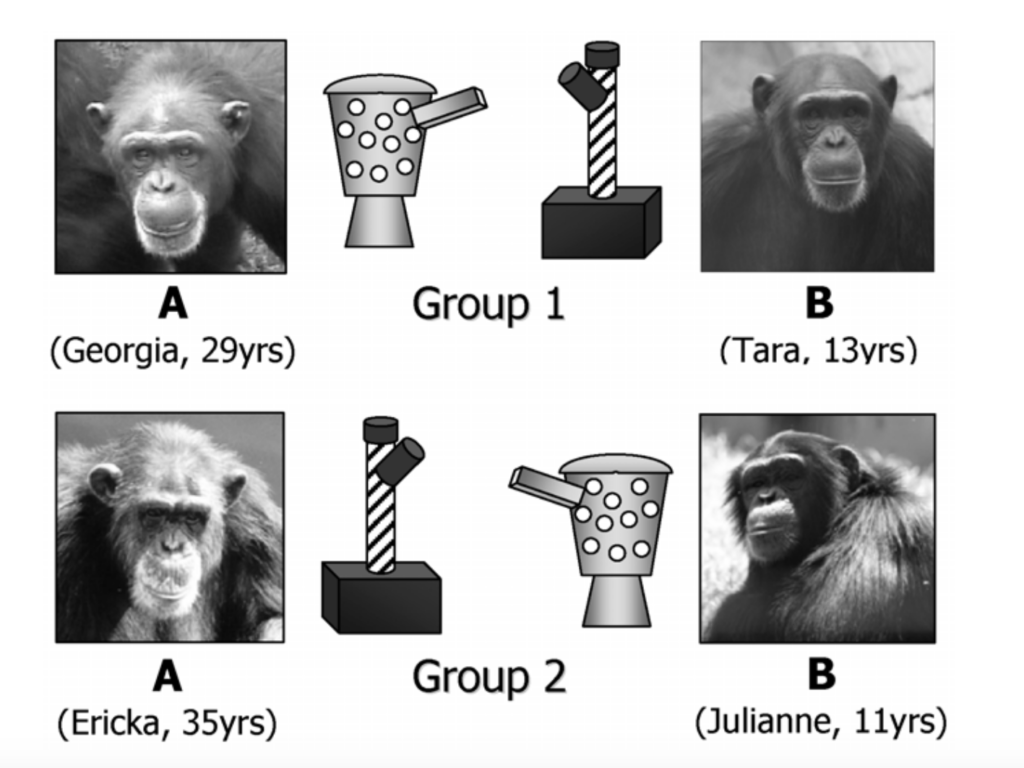Learning and prestige among chimpanzees
An interesting article by Victoria Horner, Darby Proctor, Kristin Bonnie, Andrew Whiten, Frans de Waal: “Prestige Affects Cultural Learning in Chimpanzees” in PLoS ONE, 2010, 5(5) freely available here.
In Group 1, more prestigious model A was trained to deposit tokens into the spotted receptacle while less prestigious model B was trained to use the striped receptacle. In Group 2, the model and receptacle assignments were reversed.
Abstract:
Humans follow the example of prestigious, high-status individuals much more readily than that of others, such as when we copy the behavior of village elders, community leaders, or celebrities. This tendency has been declared uniquely human, yet remains untested in other species. Experimental studies of animal learning have typically focused on the learning mechanism rather than on social issues, such as who learns from whom. The latter, however, is essential to understanding how habits spread. Here we report that when given opportunities to watch alternative solutions to a foraging problem performed by two different models of their own species, chimpanzees preferentially copy the method shown by the older, higher-ranking individual with a prior track-record of success. Since both solutions were equally difficult, shown an equal number of times by each model and resulted in equal rewards, we interpret this outcome as evidence that the preferred model in each of the two groups tested enjoyed a significant degree of prestige in terms of whose example other chimpanzees chose to follow. Such prestige-based cultural transmission is a phenomenon shared with our own species. If similar biases operate in wild animal populations, the adoption of culturally transmitted innovations may be significantly shaped by the characteristics of performers.



Dan Sperber 22 May 2010 (19:48)
Boyd, Richerson, Henrich and their collaborators have argued that there is a bias in human cultural transmission causing people to preferentially copy prestigious individuals. This article seems to strengthen the hypothesis by showing that such is also the case among chimpanzees. While the study is ingenious and interesting, I don’t see it as having that evidential force, for the following reasons. First, the idea of prestige goes together with that of reputation, i.e. of a socially shared opinion. Talking of prestige among the chimpanzees who don’t exchange their views about one another, extends the idea of prestige to that of being seen as superior. This then supports the prestige bias thesis only if, in that thesis, the idea of ‘prestige’ does not mean more than this. In other words what it supports is at best a diluted thesis where the ordinary or the sociological notion of prestige plays no role at all. Second, here is how the ‘prestigious’ individual were chosen: “In each of the two groups, we selected a pair of female models (model A and model B) … In order to test the influence of social dynamics on learning, we maximized the potential social differences between the models, such that model A was older, held one of the highest social ranks in her group (based on daily observations) and had successfully introduced novel behaviors on several previous occasions. In contrast, model B was younger, held one of the lowest social ranks and had no previous experience in introducing novel behaviors.” In other terms there is no separation of the age factor and the social rank factor. Moreover, the third criterion “had successfully introduced novel behaviors on several previous occasions” brings in an risk of circularity: We don’t know what factors may have helped an individual chimp to introduce novel behaviours in the past (imagine, for the sake of argument that it was something about her smell), and so it can be that same factor that explains her doing it successfully again. Third, the authors themselves indicate an alternative interpretation of their results: “ observers appear to have paid selective attention to model A over model B. .. Attention also appears to play a central role in the selective transmission of behavior.” If observers pay more attention to model A than to model B, then surely, everything else being equal, they are more likely to imitate A than to imitate B. They may be paying more attention to A than to B because they think that there is more to learn from A than from B, but also because it is riskier to ignore what A does than to ignore what B does, or because A is bigger and noisier, or whatever. The thesis that “prestige affects cultural learning in chimpanzees” even in its appropriately weakened version, is not properly evidenced by these experiments.